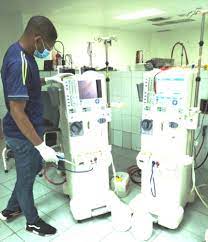
The availability of a new advanced technology for hemodialysis treatment in Ciego de Ávila allows the guarantee and quality of one of the most expensive medical services in the world, despite the economic crisis that the Cuban nation is going through after two years of pandemic and in the midst of a tightened imperialist blockade.
Dr. Juan Carlos Samblás Hernández, in charge of the provincial Nephrology service at the Provincial General Hospital, told Radio Surco that this week a batch of 24 new machines called artificial kidneys arrived for the two province services, which will allow them to offer an excellence care.
The Second Degree Specialist in Nephrology explained that this investment guarantees the sustainability of this medical assistance for several years due to the quality of the technology and the guarantee of spare parts when they are required from the machines that will be replaced after several years of exploitation.
Samblás Hernández, added that this availability allows a better quality of medical assistance in the intensive care rooms of the Roberto Rodríguez and Antonio Luaces Iraola hospitals, which will have one of these artificial kidneys for the first time to assist seriously ill patients who require it without having to transfer them to the nephrology room.
For the acquisition of this technology, the Cuban state invested a large sum of money, taking into account that a machine of this type has a value of 64,000 euros or more in the European market and on this occasion, several medical services offered by this type of hemodialysis treatment were benefited.
The nephrology service is one of the most expensive in the world and hemodialysis treatment is the most expensive, due to the supplies and technology it requires.
In Cuba, the cost of all these expensive resources has been borne by the state since this sensitive care began, which includes the guarantee of safe transportation from the patient's home to the institution and vice versa.
